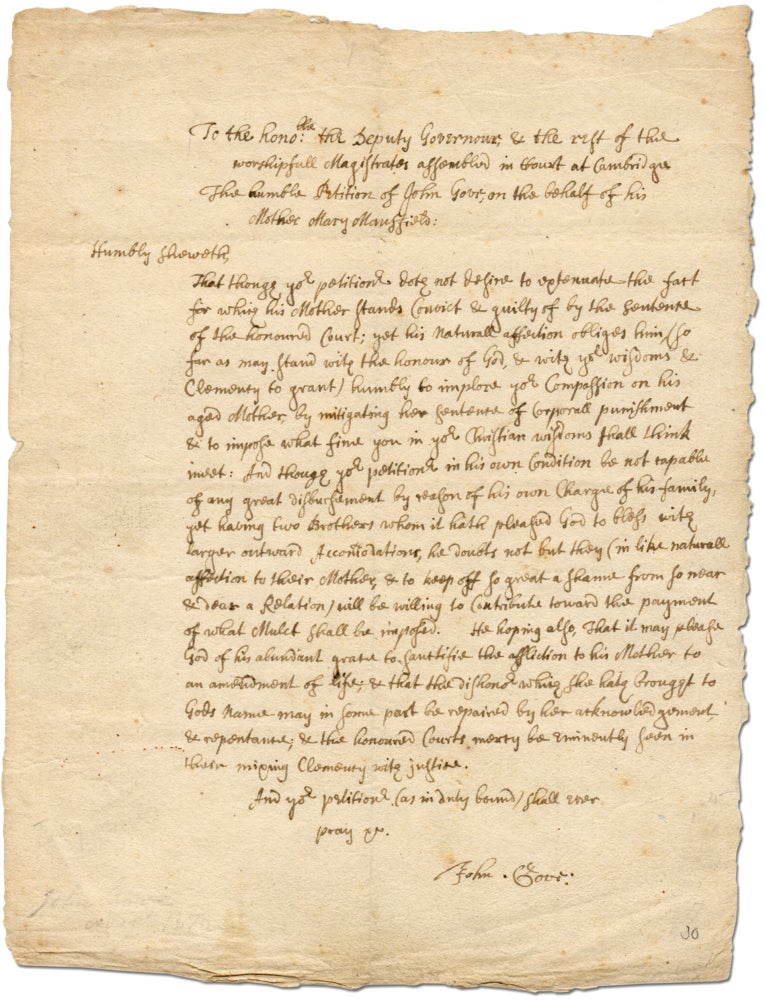Price: $14,000.00
Unbound. A splendid early Colonial letter from a Charlestown, Massachusetts man writing to the court asking for his mother's sentence of flogging be commuted to a fine. One-page Autograph Letter Signed ("John Gove") written in ink on good quality paper, measuring roughly 6" x 8" with uneven edges. Minor toning, otherwise fine.
The author of the letter, John Gove [Jr., 1631-1704] was a turner by trade who lived in Charlestown and Cambridge, Massachusetts, where he served as a constable, tithing man, and deacon of the church for many years. He was the son of a brazier, also named John Gove, whose two older sisters had both married founders of the Massachusetts Bay Colony. The senior John Gove died when his son was an infant, and his mother, Mary Gove quickly remarried to a goldsmith and merchant named John Mansfield, thus becoming Mary Mansfield.
John Mansfield proved to be improvident and quarrelsome, a trait he shared with his new wife, both of whom were living in hope of a large bequest from the recently deceased father of her first husband in England (which never came). The Mansfields had two additional children, who were placed in foster care in 1657 owing to the family’s poverty. The couple made numerous petitions to their relatives, neighbors, and the town officials concerning a variety of grievances and made themselves deeply unpopular. The arrest referenced in the letter stems from Mary Mansfield’s outburst against another Charlestown woman in 1659 over a debt owed her husband, for which she found herself sentenced to receive ten lashes.
According to a chapter devoted to her life ["Mary Mansfield 1610-1682 and the Jarndyce Effect" in the book *From Deference to Defiance: Charlestown, Massachusetts 1629-92* by Roger Thompson, 2012] Mansfield confronted the wife of Richard Russell, a local luminary:
"Mistress Mansfield said to Mistress Russell that they had sworn her husband (Mansfield) out of twenty pounds and that they would all go to the devil, and be damned, further she said some women would play the whore for maintenance before Mr. Russell should have the children, or the disposing of them, for he was her enemy and worse than a Jew. This speech was with many other unseemly words and gestures of clapping her hands in an unseemly manner."
This letter was written by her son in 1659 when he was 28 years old on behalf of his mother. In the letter Gove pleaded with the local authorities for the opportunity to pay a fine rather than have his mother subjected to corporal punishment for the crime of which she had been found guilty.
Her son’s petition was denied as newspapers of the day report that the defamation did indeed earn Mary ten lashes on the back.
By 1671, having become a liability and wards of the town, the Mansfields were ordered by the town to pick oakum, an ignominious and demeaning job, in order to receive a stipend. Three years later John Mansfield died and Mary was sent to live with her son (John's elder brother) Edward Gove, an assemblyman in Hampton, New Hampshire. She died in 1682, thus being spared a further family embarrassment when a year later Edward raised up a rebellion (made-up mostly of drunkards) against the unpopular governor of the territory. He was convicted of treason and ordered hung, drawn, and quartered. Gove's wife, Hannah, petitioned the king claiming that her husband was prone to "a distemper of lunacy or some such like, which he have been subject to by times from his youth and yet is until now, though at times seemingly rational." After spending three years in the Tower of London, the King acceded to her pleas and pardoned him.
In any event, an interesting and quite early American letter exhibiting how women were subject to corporal punishment in the Colonial Era.
A transcription of the letter below:
"To the honourable: the Deputy Governour & the rest of the worshipful Magistrates assembled in Court at Cambridge. The humble petition of John Gove on behalf of his Mother Mary Mansfield.
Humbly Showeth,
That though your petitioner does not design to [dispute?] the fact for which his Mother stands convict & guilty of by the sentence of the honoured court; yet his natural affection obliges him, (so far as may stand with the honour of God, & with your wisdom & clemency to grant) humbly to implore your compassion on his aged Mother by mitigating her sentence of corporal punishment & to impose what fine you in your Christian wisdoms shall think [ ]: and though your position in his own condition be not capable of any great disbursements by reason of his own charge of his family, yet having two brothers whom it has pleased God to bless with larger outward accommodations, he doubts not but they (in like natural affection for their Mother, & to keep off so great a shame from so near & dear relation) will be willing to contribute toward the payment of what amount shall be imposed. He hoping also, that it may please God of his abundant grace to sanctify the affection to his Mother to an amendment of life; & that the dishonor which she has brought to God’s name may in some part be repaired by her acknowledgment & repentance; & the honoured courts must be eminently seen in their [ ] clemency with justice.
And your petitioner as is duly bound shall ever pray you.
John Gove"
Item #390132


